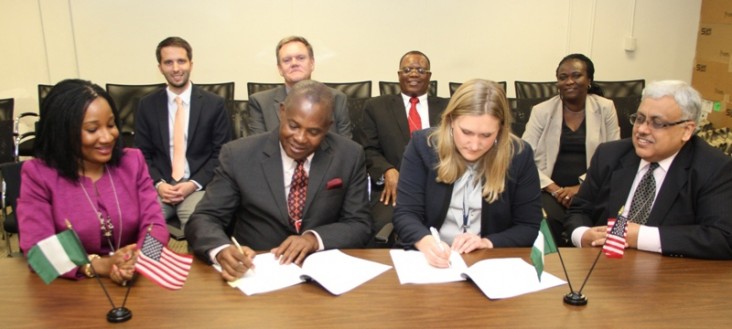- Where We Work
- Interactive Map
- Afghanistan and Pakistan
- Africa
- African Union
- Power Africa
- Trade and Investment Engagement
- Angola
- Benin
- Botswana
- Burkina Faso
- Burundi
- Cameroon
- Central Africa Regional
- Central African Republic
- Chad
- Côte d'Ivoire
- Democratic Republic of the Congo
- Djibouti
- East Africa Regional
- Ethiopia
- Ghana
- Guinea
- Kenya
- Lesotho
- Liberia
- Madagascar
- Malawi
- Mali
- Mauritania
- Mozambique
- Namibia
- Niger
- Nigeria
- Republic of the Congo
- Rwanda
- Sahel Regional
- Senegal
- Sierra Leone
- Somalia
- South Africa
- South Sudan
- Southern Africa Regional
- Sudan
- Swaziland
- Tanzania
- Uganda
- West Africa Regional
- Zambia
- Zimbabwe
- Asia
- Europe and Eurasia
- Latin America and the Caribbean
- Middle East
- Mission Directory

By Anna Humphrey, U.S. Trade and Development Agency
Together, the Eko and Ikeja Electricity Distribution Companies currently serve over one million customers in and around the State of Lagos, Nigeria. But the population of their combined service territory is much larger, with over 15.5 million people. This means that millions of people have limited to no access to consistent power. By modernizing their transmission and distribution networks, the utilities can provide more affordable, reliable power to their existing customers – and expand electricity access to more Nigerians.
These utility companies are partnering with Power Africa through the U.S. Trade and Development Agency (USTDA) to do just that. Recently, USTDA signed memoranda of cooperation in order to strengthen our existing partnerships with Eko and Ikeja. Under these partnerships, USTDA and its Power Africa partners are introducing officials from each company to U.S. industry experts who can help them further develop comprehensive plans to modernize their networks.
This ongoing cooperation is addressing one of the primary challenges of energy access in sub-Saharan Africa: the need to improve the delivery and distribution of installed power, in addition to generating new power. USTDA understands the importance of enhancing electricity transmission and distribution and, as such, has long been working to introduce our partners from across Africa to U.S. smart grid solutions that can reduce power losses and increase service reliability.
As part of those efforts, we sponsored a reverse trade mission that brought decision-makers from four of Nigeria’s recently privatized distribution companies – including officials from Eko and Ikeja – to the United States. The delegates told us they plan to invest $800 million to reduce electricity losses on their grids. The goal of the reverse trade mission was to ensure that they had access to U.S. smart grid technologies and best practices. As a direct result of the visit, all four utilities began commercial negotiations with U.S. firms that supply advanced distribution equipment.
To foster more business-to-business relationships, we are sponsoring activities that will help three of the distribution companies develop roadmaps to implement smart grid solutions throughout their networks. One feasibility study will assess the technological, economic, regulatory and financial frameworks required to expand Eko’s and Ikeja’s networks by focusing on business process reengineering and distribution automation. U.S. services firm Delphos International (Washington, D.C.) will also provide recommendations on how the two distribution companies can collaborate to ensure network interoperability.
Developing Solar Energy in East Africa
USTDA, under Power Africa, is not just working to improve power distribution in Nigeria – we’re also working to bring cleaner energy online across the continent. In fact, we also recently signed a grant agreement that will connect U.S. and African businesses aiming to develop solar power in East Africa.
USTDA awarded a grant to Gigawatt Global Burundi S.A. to support their efforts to develop a 7.5-megawatt (MW) solar photovoltaic power plant in Mubuga, Burundi. The grant funds a feasibility study that will address key technical and economic aspects of the solar project, conduct environmental and social impact assessments, and provide the necessary analysis for the developers to secure financing.
Currently, only four percent of Burundi’s population has residential access to electricity. Implementation of the proposed solar plant would increase Burundi’s installed electricity generation capacity by an estimated 15 percent, helping to power over 60,000 homes and businesses. The plant would be the country’s first utility-scale solar energy generation facility. It would also build upon the success that Gigawatt Global, a partner of Power Africa and of Power Africa’s Beyond the Grid sub-initiative, has had in Rwanda, where they recently launched East Africa’s largest utility-scale solar field.
The opportunity to conduct the USTDA-funded feasibility study in Burundi will be competed through Federal Business Opportunities (FBO). A link to the FBO announcement will be posted to USTDA’s website at www.ustda.gov. Interested U.S. firms should submit proposals according to the instructions in the FBO announcement.
These examples illustrate the value of Power Africa and of USTDA’s programs. By providing small amounts of public sector funding, we are catalyzing private investment and building long-term, business-to-business partnerships that will help power sub-Saharan Africa for years to come.







Comment
Make a general inquiry or suggest an improvement.